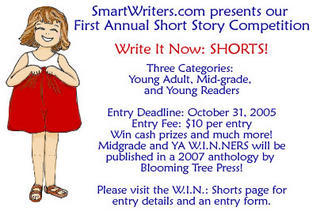 Okay, here's the thing. I wanna be in an anthology. Yeah, I know, cool people like Seren are in anthologies, and it should be enough that my friends are so cool, but nope. It's not doing it. I couldn't write a story about fruit and New Jersey for Mei's anthology either, so I'm kind of stuck - I love reading the things, and short stories are pretty fascinating, when done well, and I want to be the kind of writer who leaves readers dying for more. So, anthologies.
Okay, here's the thing. I wanna be in an anthology. Yeah, I know, cool people like Seren are in anthologies, and it should be enough that my friends are so cool, but nope. It's not doing it. I couldn't write a story about fruit and New Jersey for Mei's anthology either, so I'm kind of stuck - I love reading the things, and short stories are pretty fascinating, when done well, and I want to be the kind of writer who leaves readers dying for more. So, anthologies. And, here, offered to me in a really cool package - the first SmartWriters.com short story contest ever! And the winner wins -- inclusion in that sought after anthology!! And how could I not be jazzed? Oh, wait. There's that little matter of actually writing a YA short story, huh. Sad, but true - I'm beginning to really resent Raymond Carver. Seriously.
The fact is, there are ten million books of commentary on how to write a really good short story. There's theory about 'pyramid structure,' there's conjecture about situational writing (i.e., get a man up a tree, throw stones at him, get him down), but the fact is, modern short stories kind of ruined the simple stuff. It's not good enough to just have a story... that's...short. Now there's all this enigma and stuff. I'm not sure I can do that.
Actually, I'm pretty positive I can't. I'm not enigmatic. Is young adulthood enigmatic? Was mine? I was reading a comment from A.Fortis the other day where she mentioned hearing publishers asking for stuff that was described as "nasty" (as in brutish or dirty, I couldn't tell ya) when talking with writers at a recent conference. That word lacks, um, subtlety. So, am I completely pursuing a wrong rant, here? Is subtlety not needed in YA shorts?
This is all in the service of actually keeping me from attempting to write said short story. I'll admit it -- I'm struggling to convey something pertinent in 8000 words. It seems like that should be enough words, but I'm going to have to edit, I see. Sharply.
As usual, when in doubt, I try and read something. I've heard that Kelly Link's Stranger Things Happen is a really good read, and that she's one of the best short story writers writing for this age group. I've been reading short stories for weeks. Something's got to give, here!
Wish me luck and I wish the same to you. Enter the contest!

